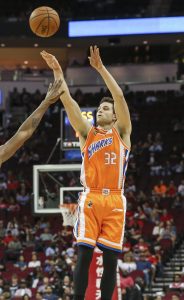When longtime Hornets beat reporter Rick Bonnell of The Charlotte Observer addressed Kemba Walker‘s contract situation in a column this past Sunday, his piece opened with a compelling lede.
“I no longer think it’s likely Kemba Walker re-signs with the Charlotte Hornets,” Bonnell wrote. “More importantly, I no longer can give you a strong argument why he should.”
Walker has had another terrific season in Charlotte, averaging a career-high 25.0 PPG to go along with 5.7 APG, 4.3 RPG, and 1.3 SPG. On a team that features no clear second-best player, Kemba earned All-Star honors for a third straight year and has single-handedly kept Charlotte in the playoff race.
Walker has also repeatedly expressed a desire to remain in Charlotte, despite the fact that the team hasn’t won a playoff series since he arrived in 2011. The Hornets have reciprocated that interest — after briefly gauging the trade market for the star point guard prior to the 2018 trade deadline, the team replaced GM Rich Cho with Mitch Kupchak, who has maintained since his hiring that he wants to retain Walker going forward.
Still, with the Hornets’ playoff hopes fading fast and unrestricted free agency right around the corner, Walker definitely can’t be considered a lock to stay, Bonnell writes. While Charlotte could offer him more years and dollars than any rival suitor, doing so would make it that much harder to build a contender around him in the coming years, as Bonnell observes. And Kemba, who turns 29 in May, figures to be seeking an opportunity to contend as he decides where he wants to spend his next few years.
A looming All-NBA decision could have an impact on the summer negotiations between Walker and the Hornets. If he earns an All-NBA spot, the former UConn standout would be eligible for a five-year deal that starts at up to 35% of the cap, rather than 30%. The difference would work out to a projected $31MM+ over those five years. Would the Hornets put that offer on the table if they’re able to? Would it sway Walker’s decision? It’s hard to say at this point, but it’s a factor worth considering.
If Walker seriously considers other teams, there should be no shortage of outside options for him. The Knicks and Mavericks are among the clubs that have been most frequently cited as possible suitors, but there will be many more teams with the ability to open maximum-salary cap room. And there are just as many teams that could use a guard with Walker’s scoring, shooting, and play-making abilities.
What do you think? Will Walker ultimately decide to stick with the Hornets after another disappointing season in Charlotte? Or do you expect the three-time All-Star to move on and sign with a new team this summer?
Vote in our poll, then head to the comment section to share your two cents on Walker’s future.
Trade Rumors app users, click here to vote.
